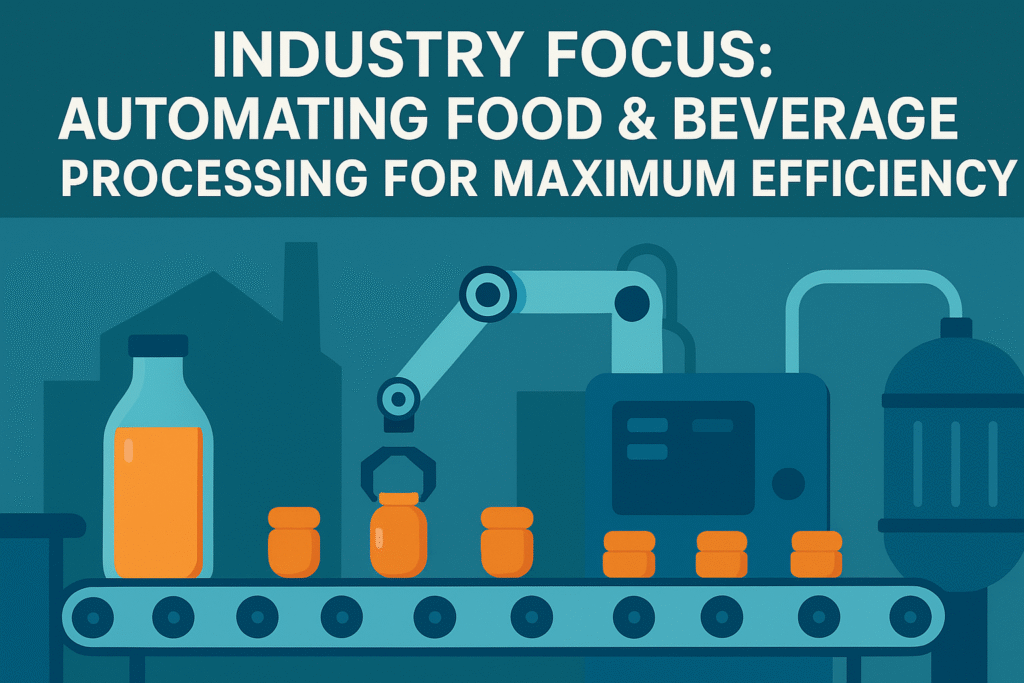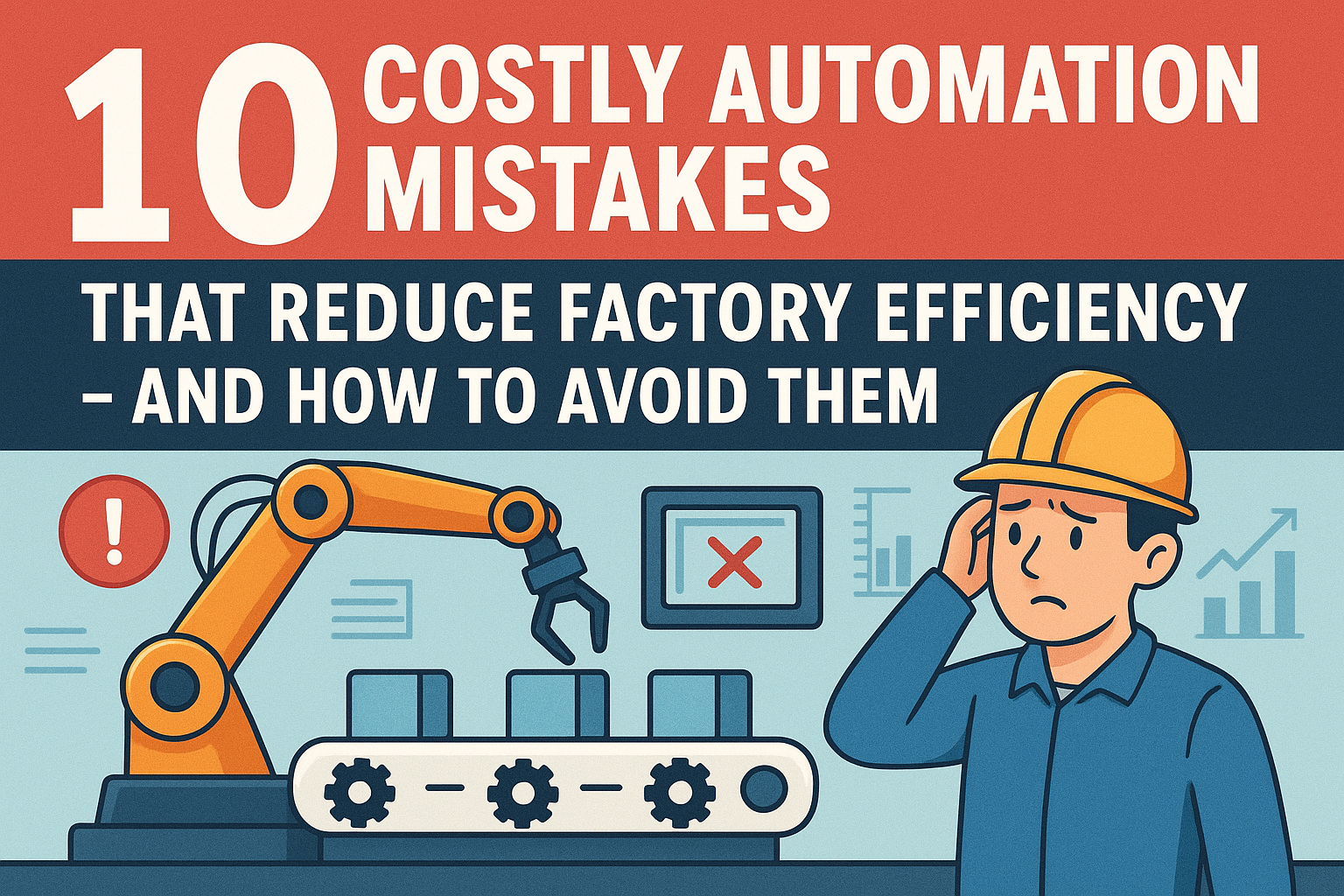
The Food & Beverage (F&B) industry is one of the most dynamic and fast-evolving sectors globally. Meeting consumer demand for quality, safety, and speed while maintaining cost efficiency presents unique challenges. To thrive, modern F&B processing plants must embrace automation to streamline operations, improve product consistency, reduce waste, and ensure compliance with stringent regulations.
Automation technologies like Programmable Logic Controllers (PLCs), Supervisory Control and Data Acquisition (SCADA) systems, robotics, and Internet of Things (IoT) devices are transforming the way food and beverage plants operate. This comprehensive guide dives into how automation maximizes efficiency in food & beverage processing, highlighting key technologies, applications, challenges, and real-world examples — including solutions offered by Margo Industries, a trusted name in industrial automation.
Increasing Production Demands and Market Competition
Consumer demand for diverse food products with shorter lead times forces manufacturers to ramp up production rates without compromising quality.
Stringent Safety and Regulatory Requirements
Food safety standards like FDA, HACCP, and FSSAI demand strict process control, traceability, and contamination prevention.
Ensuring Consistent Product Quality
Automated systems guarantee uniform mixing, cooking, and packaging, critical for brand reputation.
Cost Reduction and Waste Minimization
Automation reduces human errors, material wastage, and downtime, leading to significant cost savings.
Addressing Labor Shortages and Skill Gaps
The food industry faces a shrinking skilled workforce. Automation fills this gap by handling repetitive and hazardous tasks.
2.1 Programmable Logic Controllers (PLCs)
PLCs are industrial computers that control machinery operations. They are highly reliable and customizable, making them ideal for automating mixers, conveyors, filling machines, and packaging units.
2.2 SCADA Systems
SCADA provides centralized control and real-time monitoring of plant operations. Through user-friendly Human-Machine Interfaces (HMIs), operators track data, set parameters, and receive alarms to promptly address issues.
2.3 Robotics and Automated Material Handling
Robots and Automated Guided Vehicles (AGVs) improve packaging, palletizing, and internal logistics, enhancing speed and reducing contamination.
2.4 IoT Sensors and Smart Devices
Sensors monitor temperature, humidity, pressure, pH, and flow rates, providing crucial data to maintain process control and food safety.
2.5 Vision Systems and AI for Quality Inspection
Advanced cameras and AI algorithms detect defects and ensure products meet quality specifications without slowing down production.
3.1 Raw Material Handling and Storage
Automated weighing, dosing, and inventory management reduce manual errors and enable precise recipe control. For example, Margo Industries’ Automatic Batch Weighing System ensures accurate raw material measurement.
Automatic Batch Weighing System
3.2 Mixing and Blending
Automation guarantees consistent mixing times and ratios, essential for product uniformity.
3.3 Cooking, Pasteurization, and Heat Treatment
Temperature and time controls ensure safe processing and maintain taste and texture.
3.4 Filling and Packaging
Robotic filling systems minimize human contact, ensuring hygiene and faster throughput.
3.5 Cleaning-in-Place (CIP) Systems
Automated CIP systems clean equipment efficiently with minimal downtime, essential for hygiene compliance.
Benefit | Description |
Improved Productivity | Continuous production with reduced manual intervention and downtime. |
Enhanced Food Safety | Precise control and monitoring minimize contamination risks and ensure compliance. |
Reduced Waste and Cost | Accurate dosing and real-time monitoring decrease raw material losses. |
Consistent Product Quality | Automation ensures every batch meets exact standards, building customer trust. |
Better Traceability & Reporting | Automated record-keeping facilitates audits and regulatory reporting. |
Labor Efficiency & Safety | Automation handles repetitive, hazardous tasks freeing human labor for skilled activities. |
5.1 Legacy Equipment Integration
Many plants operate with old equipment; integrating modern automation requires custom interface solutions.
5.2 High Upfront Costs
Initial investments can be high, but long-term ROI through efficiency and reduced errors justifies it.
5.3 Workforce Training and Change Management
Employee resistance and skill gaps necessitate comprehensive training programs.
5.4 Maintaining Hygiene Standards
Automation hardware must meet food-grade standards and be easy to clean to avoid contamination.
5.5 Cybersecurity Risks
Industrial systems need robust cybersecurity protocols to prevent breaches and downtime.
Margo Industries offers a comprehensive range of automation solutions designed specifically for bulk material handling and process control in food & beverage industries. Their products integrate seamlessly with PLC and SCADA systems, enhancing visibility and control over complex processes.
Notable Margo Products with Automation Capabilities:
- Automatic Batch Weighing System — for precise raw material measurement.
Link - Vacuum Conveying System — dust-free pneumatic transfer ensuring hygienic material movement.
Link - Liquid Dosing and Weighing System — precise liquid ingredient dosing for accurate formulations.
Link - Fully Automatic Compounding Plant with PLC-SCADA — end-to-end automated processing with real-time monitoring.
Link
A leading food manufacturer integrated Margo Industries’ fully automatic compounding plant solution equipped with PLC and SCADA systems. The result was:
- Improved batch accuracy by 99.5%.
- Reduced manual errors by 85%.
- Real-time visibility into production KPIs.
- Faster changeovers and reduced downtime.
This demonstrates how combining material handling automation with advanced control systems drives operational excellence.
- Smart Factories and IoT: Full connectivity enabling predictive maintenance and quality analytics.
- Artificial Intelligence & Machine Learning: Real-time decision-making for process optimization.
- Blockchain for Supply Chain Transparency: Ensuring traceability and consumer trust.
- Sustainable Automation: Energy-efficient technologies reducing environmental impact.
Conclusion
Automating food & beverage processing is essential for meeting today’s demanding market, regulatory, and quality standards. Leveraging advanced technologies like PLCs, SCADA, robotics, and IoT transforms production lines into efficient, consistent, and safe operations.
Partnering with automation experts like Margo Industries ensures tailored, reliable solutions that optimize material handling, process control, and overall plant visibility — paving the way for maximum efficiency and profitability.


